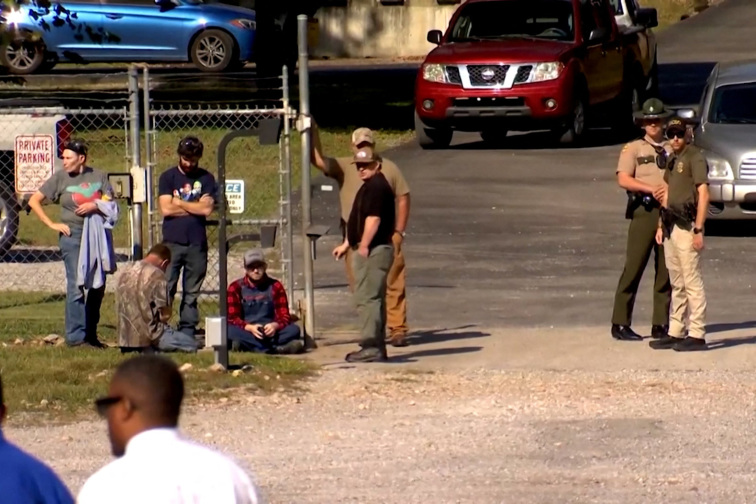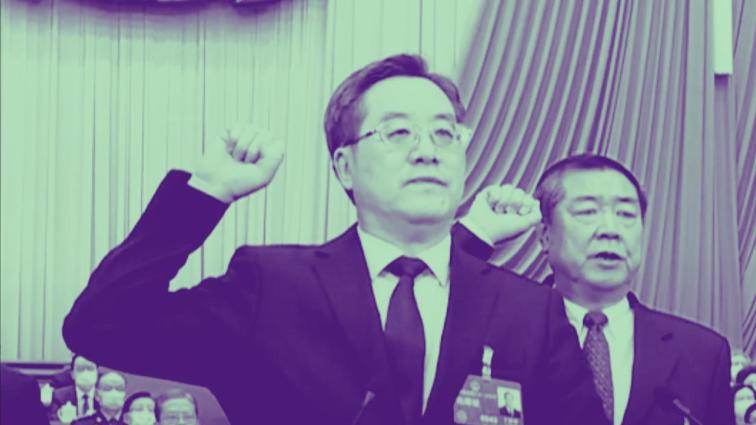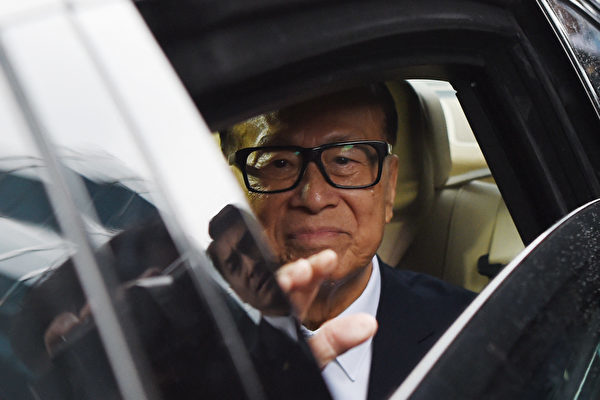At around 3:30 a.m. on July 26, Yang Lanlan crashed her Rolls-Royce head-on into a Mercedes-Benz in Sydney’s eastern suburbs. (Online image)
[People News] The case involving Chinese billionaire Yang Lanlan, who is suspected of drunk driving and causing serious injuries to others, had its fourth court hearing on November 14 at the Downing Centre Local Court in Sydney. Yang Lanlan was once again absent, and her defence lawyer did not arrive until the end of the hearing. The lawyer denied four charges on her behalf. The next hearing is scheduled for January 30 of next year. Yang Lanlan's unexpected not guilty plea raises questions about whether this is a strategy from her legal team. Multiple theories about Yang Lanlan's background have circulated, and now a new version has emerged that is even more astonishing.
Let’s briefly recap the case.
In the early hours of July 27, 23-year-old Yang Lanlan was driving a Rolls-Royce valued at 1.5 million Australian dollars when she collided head-on with a Mercedes-Benz in Rose Bay, Sydney. The impact was so severe that it left the 52-year-old Mercedes driver with serious injuries, including fractures to the spine, ribs, and both femurs, which the media reported could result in a “potential lifelong disability.” In contrast, Yang Lanlan emerged from the incident unscathed. The sound of the collision even triggered alarms in several nearby shops, indicating the force of the accident was extremely intense.
According to police evidence, Yang Lanlan briefly left the scene after the incident but returned and tested positive for alcohol in a roadside test, although she refused to undergo a second alcohol test at the police station.
Since July, the case has gone through four court hearings. Yang Lanlan has appeared via video link each time, and the hearings have been brief. During the fourth hearing, the defence lawyer announced a “not guilty” plea.
In fact, Yang Lanlan's previous three consecutive absences from the hearings had drawn dissatisfaction from the court registrar. At the conclusion of the third hearing, the registrar explicitly requested that Yang Lanlan appear in person for the fourth hearing; however, she still failed to show up.
The fourth hearing was a procedural one, presided over by the court's registrar, and it was very brief, lasting less than five minutes.
In response to Yang Lanlan's continued absence, her defence attorney, Michael Cohen, stated that she was permitted to attend via video due to 'serious mental health issues' and 'extreme anxiety' stemming from media pressure, which made her reluctant to go out.
A significant highlight of the fourth hearing was that Yang Lanlan's lawyer denied all four charges on her behalf, which included: dangerous driving causing serious injury to others, negligent driving causing serious injury to others, refusal or failure to submit to a breath analysis, and failure to provide the police with driver or vehicle information.
Yang Lanlan's not guilty plea was described by the media as a 'bombshell twist,' shocking everyone present. This was particularly surprising given that her lawyer had previously requested multiple delays, hinting at possible negotiations for a reduced sentence or a guilty plea. Ultimately, however, Yang Lanlan chose to deny all charges, and the case officially entered the trial phase. Her lawyer indicated that this decision was based on a review of evidence with the prosecution, and Yang Lanlan firmly believes in her innocence.
The prosecution told the court that they needed a longer adjournment in order to hire an alcohol-testing expert. Most of the evidence summary could be submitted before December, but the expert materials might require more time.
The prosecution requested that police submit a complete brief of evidence to the defence by January 9, 2026, including footage of the accident, witness testimonies, the victim’s medical reports, and Yang’s alcohol-test records. The evidence is expected to focus on the details of the incident.
After this hearing, the court scheduled the next session for January 30, 2026, and Yang Lanlan may be required to appear in person. If the evidence is submitted smoothly, the trial may accelerate; otherwise, it could be further delayed.
Sydney lawyer Newton Xu told Dajiyuan that Yang Lanlan’s denial of all charges was “surprising.” However, he believes this may be one of the defence strategies.
Xu explained that, generally speaking, once a defendant enters a plea of “not guilty,” the prosecution must prepare and submit a complete evidence brief—an enormous undertaking. However, after receiving the prosecution’s evidence, the defendant is still legally allowed to change their plea from “not guilty” to “guilty.” But if Yang had chosen to plead guilty at this mention hearing, the defence would be relatively passive in later stages.
Xu emphasised that if Yang still insists on pleading not guilty at the next hearing, the case will move into a formal trial process.
Under Australian law, when a defendant pleads not guilty, the case proceeds into a lengthy and formal legal process, including trial hearings, evidence review, witness statements, and possible defences and appeals. This means the defendant disputes the charges, and the case will not end quickly; it must go through hearings and evidence exchange to reach a conclusion. In other words, Yang Lanlan’s case will continue to drag on, and it is unclear when a final judgment will emerge.
Compared with previous hearings, public attention was noticeably lower this time. At the first hearing, more than a hundred Chinese community members lined up to observe, whereas this time, fewer than ten attended. They expected Yang to appear, but were once again disappointed.
Lawyer Michael Cohen is the son of John Cohen, Yang’s former defence barrister. John Cohen has over 40 years of criminal defence experience and has repeatedly been listed among “Sydney’s Leading Criminal Defence Lawyers” and as one of Australia–New Zealand’s “Most Influential Lawyers.” In 2017–2018, when Chinese actor Gao Mingxiang was accused of sexual assault in Sydney, he served as lead defence counsel and successfully secured Gao’s acquittal. His son, Michael Cohen, specialises in defending celebrities and high-income individuals, with cases largely involving corporate crime, sexual assault, murder, and drug trafficking. Reportedly, Yang Lanlan will pay at least AUD 500,000 in legal fees, while Gao Mingxiang paid AUD 300,000 at the time. But if this case ends abruptly due to “insufficient evidence,” it would effectively send a message to the world: as long as you are rich enough, you can bend the law like clay.
Regarding Yang Lanlan’s case, we will leave it there for now. In this incident, much attention has focused on Yang, while the condition of the victim—Mercedes driver George—has been relatively overlooked.
When The Daily Mail contacted George, he said, “My lawyer told me to keep quiet. I’ve remained silent and cannot disclose anything about what happened.”
Fifty-two-year-old George is the private chauffeur of a well-known Australian radio host. His friends say that due to the severity of his injuries, he is unlikely to return to work.
A GoFundMe established by NSW’s Hire Car Association raised AUD 8,620 for George, and after platform fees, he received AUD 8,413.86.
The association’s founder, Simon, said: “George suffered catastrophic injuries from head to toe.”
George’s car was totalled in the accident, and he lost his means of livelihood. He currently has no income, and in addition to the physical trauma, he faces growing medical bills.
Yang’s lawyer, Michael Cohen, previously mentioned that the defence was considering negotiating a civil compensation settlement with the victim, rumoured to exceed AUD 4.6 million, but the criminal proceedings will remain separate. George told the Daily Mail he could not disclose whether Yang’s lawyer had contacted him.
While the victim, George, struggles in pain and confronts crushing medical expenses, an affluent Chinese-Australian acquaintance of Yang revealed details of Yang’s secret life of luxury.
A Daily Mail report on October 4 disclosed that Yang, who goes by the name “Cynthia” online, frequently posts photos of luxury goods and fine-dining restaurants on Instagram. She came to Australia at age 14 to study business, but reportedly never attended classes and speaks English less fluently than many international students.
Yang is also one of Chanel’s VVIP clients in Australia. To qualify as a Chanel VVIP, annual spending must exceed AUD 1 million. Yang was invited as a VVIP to a private Chanel dinner at the Sydney Opera House, attended by Hollywood celebrities. She receives first previews of new collections, as well as one-on-one styling and personalised shopping services.
Yang frequently visits Sydney’s top Cantonese restaurants and luxury steakhouses. These venues typically cost several hundred dollars per person, while Yang often spends far more. She usually books the best private rooms or scenic tables, enjoying maximum privacy and comfort. She prefers ordering the most expensive items—rare seafood, premium Wagyu, and aged wines. Her dinner bills often exceed a thousand dollars, a near-astronomical figure for ordinary consumers.
But the most painful contrast comes later. Yang’s pet dog “Wangzai” wears an AUD 990 Chanel collar, lies on a Hermès pillow, and sleeps under a Hermès blanket. One netizen calculated that the dog’s outfit alone could pay for half a month of George’s ICU stay. Meanwhile, Yang herself has never said a single “sorry” to the victim, aside from issuing a statement through her lawyer.
Yang has missed four hearings. Outsiders believe she is “too arrogant” and must have powerful backing. When asked whether she had ties to the Chinese Communist Party, her lawyer avoided the question, merely stating she currently holds Australian permanent residency as a foreign national.
Yang’s mysterious background has long drawn public curiosity. Some rumours claim she works in a secretive industry or is the descendant of high-ranking CCP elites—described as a “celestial dragon person.” There are even claims that she is Xi Jinping’s illegitimate daughter. According to CCP naming conventions among second- and third-generation “red aristocrats,” doubling characters like “Lanlan” are extremely common—e.g., Bo Guagua and Wan Baobao—symbolising a shift away from political roles and toward enjoying wealth overseas.
Recently, commentator Zhai Shanying revealed the so-called “Yan’an Seed Project.” A source told him that the project was initiated by Deng Xiaoping. The core idea was to preserve the DNA of seven leaders from the Yan’an era, hoping that regardless of the CCP’s future, their lineage would continue. But Zhai said he does not know which seven leaders were involved.
The project reportedly selected nearly 200 women to bear children for them. But these descendants are unaware of their bloodlines. The CCP allegedly allocated large amounts of hidden wealth to support them, ensuring the Yan’an leaders’ lineage could survive even if the CCP fell or their known descendants faced retribution. These “invisible descendants” are required to live in isolation with limited outside contact. After growing up, they are assigned secretive tasks, and at certain moments, they may be revealed publicly.
Zhai believes Yang Lanlan is likely one of the “Seed Project” descendants.
A few days ago, another leak claimed that Yang’s passport and ID showed she was from Inner Mongolia, raising speculation that she was the daughter of a coal boss—rumours seen as an attempt to whitewash her background. After all, if she were truly a member of the Xi family, any identity documents could be fabricated.
Regardless of these rumours, Yang’s vast wealth reflects how CCP elites launder money and transfer assets overseas. The scale of the CCP's hidden overseas funds must be astronomical.
Before the third hearing, the media discovered that Yang’s luxury ocean-view apartment had been emptied and her multi-million-dollar car had mysteriously disappeared. Even the last place that allowed her to remain in the public eye has been removed.
In fact, Yang is also pitiful in some ways. Her lawyer claims she has severe psychological issues, and while the public assumes this is an excuse to reduce her culpability, a close friend revealed that Yang indeed has poor mental health, an introverted personality, weak English, and only associates with Chinese circles. This adds a tragic layer to her story.
This is not an attempt to whitewash her or defend her. To outsiders, she seems to have everything—chauffeured Rolls-Royces, Chanel as everyday luxury, even her dog sleeps under Hermès. But arriving in Australia as a teenager, at an age when her identity was still forming, she likely experienced cultural rupture, language barriers, and years of growing loneliness. She has almost no friends, and her social circle is painfully narrow. Everyone wishes to live in the sunlight, but she can only hide in the shadows. Money can solve “external problems” like food, clothing, housing, and transportation—but cannot fix “internal problems” like loneliness, anxiety, and the desire to be understood. What she needs more than anything is a few genuine friends, conversations on equal footing, the ability to go outside without covering her face, and a life where she can finally breathe freely. Right now, she lives like a lightless mouse inside a palace.
(People News original publication)











News magazine bootstrap themes!
I like this themes, fast loading and look profesional
Thank you Carlos!
You're welcome!
Please support me with give positive rating!
Yes Sure!